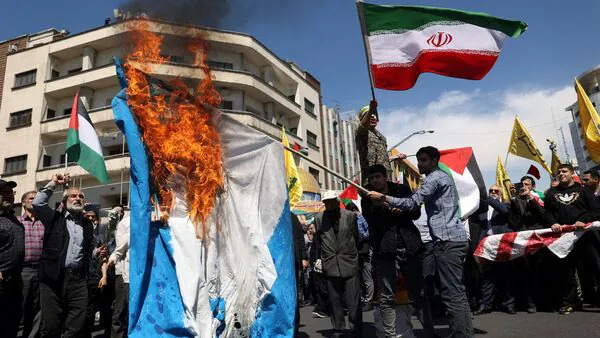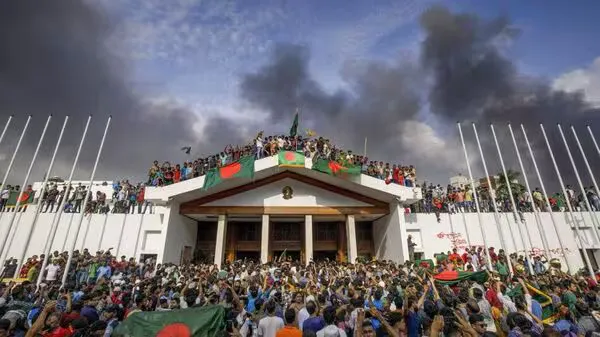From national politics and international affairs to environmental concerns and advances in science and technology, here are the top twelve issues that captured everyone’s attention this year.
On April 14, Iran launched hundreds of drones and missiles towards Israel in retaliation for an Israeli attack on its consulate that occurred in Damascus, Syria, on April 2. This attack became the immediate cause of the escalating conflict between Iran and Israel.

 Iranians burn an Israeli flag during a rally marking Quds Day and the funeral of members of the Islamic Revolutionary Guard Corps who were killed in a suspected Israeli airstrike on the Iranian embassy complex in the Syrian capital Damascus, in Tehran, Iran, April 5, 2024. (Photo: Reuters)
Iranians burn an Israeli flag during a rally marking Quds Day and the funeral of members of the Islamic Revolutionary Guard Corps who were killed in a suspected Israeli airstrike on the Iranian embassy complex in the Syrian capital Damascus, in Tehran, Iran, April 5, 2024. (Photo: Reuters)
Although Iran and Israel have a long history of bitter conflict and covert military actions against each other, this was the first time Iran has launched a direct attack of this scale aimed at targets within Israel.
Click here to read more on Iran-Israel Conflict
2. Nestle and MDH Controversies
The controversies surrounding Nestle, MDH, and Everest spice mixes raised concerns about food safety and standards, bringing India’s food regulator, FSSAI, into the news headlines in June 2024.
 The controversies surrounding Nestle, MDH, and Everest spice mix raised concerns about food safety and standards. (Photos: everestfoods.com/mdhspices.com)
The controversies surrounding Nestle, MDH, and Everest spice mix raised concerns about food safety and standards. (Photos: everestfoods.com/mdhspices.com)
MDH and Everest Issue — The government of Hong Kong has banned four products of Indian manufacturers MDH Pvt. and Everest Food Products Pvt. in the country. A press release by the Centre for Food Safety (CFS) of the Food and Environmental Hygiene Department said that “samples of several kinds of prepackaged spice mix products were found to contain a pesticide, ethylene oxide.”
Indian spice maker MDH said its products are safe for consumption, and the company has not received any communication from regulators and authorities in Hong Kong or Singapore about alleged contamination in its products.
Nestle Issue— The International Baby Food Action Network (IBFAN) and the Switzerland-based investigating agency, Public Eye, alleged that Nestle added 2.7 g of sugar per serving to its baby food brand, Cerelac, destined for developing countries, including India. Nestle has defended itself and said that it has reduced added sugar in its baby food products in India by over 30 per cent over the past five years.
Click here to read more on “Nestle and MDH Controversies”
3. Heatwaves
Higher daily peak temperatures and longer, more intense heatwaves are becoming increasingly common worldwide. This summer, India also experienced the impact of more frequent heatwaves, which have had devastating effects on human health and the environment.
 Higher daily peak temperatures and longer, intense heatwaves are becoming increasingly frequent globally.
Higher daily peak temperatures and longer, intense heatwaves are becoming increasingly frequent globally.
According to the Indian Meteorological Department (IMD)- A heatwave is a period of abnormally high temperatures, more than the normal maximum temperature that occurs during the summer season in the North-Western parts of India. Heatwaves typically occur between March and June, and in some rare cases even extend till July. The extreme temperatures and resultant atmospheric conditions adversely affect people living in these regions as they cause physiological stress, sometimes resulting in death.
Click here to read more on “Heatwaves”
4. Misuse of Deepfakes
In the General Elections of 2024, the widespread misuse of deepfakes significantly complicated the battle against misinformation. A deepfake video featuring actors Ranveer Singh and Aamir Khan purportedly endorsing a particular political party went viral during the elections. Earlier, a video that supposedly shows actress Rashmika Mandanna entering an elevator sparked a major controversy online. What initially appeared to be genuine was, in fact, a deepfake of the actress. The original video featured a British Indian girl, whose face was morphed to replace Mandanna’s.
Deepfakes constitute fake content — often in the form of videos but also other media formats such as pictures or audio — created using powerful artificial intelligence (AI) tools. It is an amalgamation of the words “deep learning” and “fake” and it means fabricated videos generated from existing face-swapping techniques and technology.
They are called deepfakes because they use deep learning technology, a branch of machine learning that applies neural net simulation to massive data sets, to create fake content. It employs a branch of artificial intelligence where if a computer is fed enough data, it can generate fakes that behave much like a real person.
Click here to read more on “Deepfakes”
5. 5oth Year of Emergency
On June 25, 2024, India entered the fiftieth year of the imposition of the National Emergency, a period from 1975 to 1977 during which civil liberties were suspended, press freedom restricted, widespread arrests made, and elections postponed.
Generally, the term “emergency” refers to the period from June 25, 1975, to March 21, 1977, during which the government of Prime Minister Indira Gandhi used special provisions in the Constitution to impose sweeping executive and legislative consequences on the country. However, emergency provisions contained in Part XVIII of the Constitution of India, from Articles 352 to 360, talk about the three different types of emergencies- (i) National Emergency (Articles 352-354, 358-359) (ii) President’s rule (Articles 355–357) (iii) Financial Emergency (Article 360)
 The blank editorial which The Indian Express published on June 27, 1975, in its first edition after the Emergency was declared late on June 25.
The blank editorial which The Indian Express published on June 27, 1975, in its first edition after the Emergency was declared late on June 25.
The declaration of Emergency converts the federal structure into a de facto unitary one, as the Union acquires the right to give any direction to state governments, which, though not suspended, come under the complete control of the Centre.
Click here to read more on “Understanding Emergency”
6. Wayanad Landslide
In July, a devastating Wayanad landslide in Kerala claimed hundreds of lives. The landslide, triggered by a cloudburst, affected Meppadi, Mundakkai, and Chooralmala and resulted in the collapse of a nearby bridge that was used to enter Attamala in Mundakkai.
 A drone view shows a landslide site after multiple landslides in the hills in Wayanad district, in the southern state of Kerala. (Reuters)
A drone view shows a landslide site after multiple landslides in the hills in Wayanad district, in the southern state of Kerala. (Reuters)
Not only in India but around the world, the frequency of landslides has increased. The increased frequency and large-scale hazards associated with landslides have made them one of the most significant natural disasters for mankind.
Notably, a landslide is a physical phenomenon in which a mass portion of rock, debris, or soil falls due to the influence of gravity. Landslides are one of the common geological hazards in hilly areas throughout the world.
Click here to read more on “Wayanad Landslide”
7. Bangladesh’s Political Upheaval
The political upheaval in Bangladesh in August 2024 resulted in the ouster of former Prime Minister Sheikh Hasina and the establishment of an interim government led by Nobel laureate Muhammad Yunus. This event is considered a significant turning point in Bangladesh’s history and has introduced new dynamics in regional politics.
 People gather around the residence of Bangladeshi prime minister in Dhaka, Bangladesh, 05 August 2024. (EPA-EFE/STR via PTI)
People gather around the residence of Bangladeshi prime minister in Dhaka, Bangladesh, 05 August 2024. (EPA-EFE/STR via PTI)
India and Bangladesh share a unique relationship rooted in a common cultural heritage, shared principles, and values. However, recent regime changes in Bangladesh are affecting this relationship, particularly with the rising concern over atrocities against Hindus in Bangladesh, which has become a significant challenge in their bilateral relations.
Click here to read more on “Bangladesh’s Political Upheaval”
8. RG Kar rape-murder case
The rape and murder of the young trainee doctor at Kolkata’s R. G. Kar Medical College and Hospital sparked protests in the state and nationwide outrage in August 2024. A 33-year-old civic volunteer, working for the Kolkata Police, was arrested a day after the body of the junior doctor was found inside the seminar hall of the hospital.
This incident once again brought attention to the issue of sexual violence against women. It served as a wake-up call to ensure that all spaces, including workplaces, homes, colleges, public transport, and public places, are safe for women.
 Women at the ‘Reclaim the Night’ protest in Kolkata. (Image: Partha Paul)
Women at the ‘Reclaim the Night’ protest in Kolkata. (Image: Partha Paul)
According to National Crime Records Bureau’s (NCRB) Crime in India Report 2022- 4,45,256 cases of crime against women were registered in 2022. This was an increase of 4 per cent compared to 4,28,278 cases in 2021. The majority of cases under crime against women were registered under ‘cruelty by husband or his relatives’ at 31.4 per cent followed by kidnapping and abduction of women at 19.2 per cent assault on women with intent to outrage her modesty at 18.7 per cent and rape at 7.1 per cent.
The United Nations defines violence against women as “any act of gender-based violence that results in, or is likely to result in, physical, sexual, or mental harm or suffering to women, including threats of such acts, coercion or arbitrary deprivation of liberty, whether occurring in public or in private life”.
Click here to read more on “Violence against women”
9. India-Canada Diplomatic Row
In mid-October 2024, the sharp escalation of the diplomatic row between India and Canada, a first-of-its-kind situation in India’s diplomatic relations with the West, raised concerns about potential ripple effects in a range of areas, including trade and people-to-people ties.
Notably, the diplomatic tension between India and Canada escalated on October 14, when India ordered the expulsion of six Canadian diplomats while also announcing its decision to withdraw the Indian High Commissioner to Canada and “other targeted diplomats,” citing security concerns after Ottawa identified them as “persons of interest” in its investigation into the killing of Khalistan separatist Hardeep Singh Nijjar.
 Prime Minister Narendra Modi and his Canadian counterpart Justin Trudeau. (File Photo)
Prime Minister Narendra Modi and his Canadian counterpart Justin Trudeau. (File Photo)
The bilateral ties between India and Canada are long-standing and significant. Canada is home to a high percentage of Sikhs. However, the two countries’ bilateral relations have been affected by various issues, such as Khalistani separatism and Canada’s position on human rights in India. These issues have led to increased tensions and have impacted diplomatic interactions.
Click here to read more on “India-Canada Diplomatic Row”
10. Section 6A and Citizenship
On October 17, 2024, the Supreme Court upheld the constitutional validity of Section 6A of the Citizenship Act, 1955, and called for stricter implementation of laws against illegal immigration and judicial monitoring of the implementation of immigration and citizenship legislation. Section 6A grants citizenship to immigrants who entered Assam before March 24, 1971.
Section 6A was contested on the grounds that it violates constitutional provisions on citizenship and goes against the Right to Equality by setting a different yardstick for Assam compared to the rest of the country. The petitioners had also alleged that by allowing migration, the clause hurts the ability of Assam’s “indigenous communities to protect their culture” — and that it, therefore, violates Article 29 of the Constitution.
Citizenship is a specific legal relationship between an individual and a state. It is a legal status that grants a person the right to reside in a country and to receive protection from that country. In India, like in every other democratic country, there are laws related to citizenship.
The term “citizenship” is not explicitly defined in the Constitution, but Articles 5-11 provide the framework for citizenship at the time of the Constitution’s commencement. The Constitution establishes a single form of citizenship, known as national citizenship, without differentiating based on states.
Click here to read more on “Section 6A and Citizenshhip”
11. Political Upheaval in Syria
The Syrian civil war saw major developments in December this year. The government of President Bashar al-Assad, who has ruled the Middle Eastern country since 2000, faced sudden and intense attacks from the rebel group Hayat Tahrir al-Sham. On December 8, the group reached the capital, Damascus, and celebrated the fall of Assad’s regime.
 Syrian opposition fighters pose for a photograph as they celebrate at Umayyad Square in Aleppo, Syria, Dec. 9, 2024. (AP Photo/Omar Sanadiki)
Syrian opposition fighters pose for a photograph as they celebrate at Umayyad Square in Aleppo, Syria, Dec. 9, 2024. (AP Photo/Omar Sanadiki)
Notably, New Delhi was preparing to revive its political and economic ties with Damascus late last month. On November 29, India and Syria held Foreign Office Consultations in New Delhi. India has been a keen developmental partner for Syria and is also actively involved in the capacity-building of the Syrian youth
The Syrian civil war began around the “Arab Spring” of 2010, dubbed so as many countries in the Middle East and North Africa saw uprisings against authoritarian governments that had been in power for decades. Foreign governments, such as the United States and Russia, also engaged with the conflict based on their respective strategic interests.
The Arab Spring also echoed in street protests in Syria. But Assad put it down with force unleashing a harsh crackdown on those opposing the regime. This set off a civil war, with the US backing the rebels while Russia, Iran and Hezbollah backing Assad.
Click here to read more about “Hayat Tahrir al-Sham”
12. One Nation, One Election Debate
The discussion on simultaneous elections has been a prominent topic throughout the year. Recently, the Union Cabinet approved the Constitution (One Hundred and Twenty-Ninth Amendment) Bill, 2024, along with the Union Territories Laws (Amendment Bill), 2024. This has reignited the debate over “One Nation One Election” (ONOE). Some believe that simultaneous elections would benefit the citizens, while others argue that it would undermine the basic structure of the Constitution of India.
Notably, the high-level committee headed by former President Ram Nath Kovind has recommended that the government take a “one-time transitory measure”, which would require the Union government to identify an “appointed date” immediately after a Lok Sabha election and all state assemblies that go to poll after the said date would have their terms expire with the Parliament.
 Ram Nath Kovind, Chairman of the High-Level Committee (HLC) on ‘One Nation, One Election,’ submitted the report to President Droupadi Murmu in New Delhi on March 14, 2024. Two of the committee members, Union Home Minister Amit Shah and DPAP leader Ghulam Nabi Azad, were also seen. (PTI Photo)
Ram Nath Kovind, Chairman of the High-Level Committee (HLC) on ‘One Nation, One Election,’ submitted the report to President Droupadi Murmu in New Delhi on March 14, 2024. Two of the committee members, Union Home Minister Amit Shah and DPAP leader Ghulam Nabi Azad, were also seen. (PTI Photo)
Simultaneous elections, popularly referred to as “One Nation, One Election”, means holding elections to Lok Sabha, all state Legislative Assemblies, and urban and rural local bodies (municipalities and panchayats) at the same time. Currently, all these elections are held independently of one another, following timelines dictated by the terms of every individual elected body.
Click here to read more on “One Nation, One Election Debate”
The coming year will witness new developments in most of the above-mentioned stories. So, don’t miss out on keeping a watch on them in 2025 too.
For your queries and suggestions write at roshni.yadav@indianexpress.com
The Indian Express UPSC Essentials brings to you the November issue of its monthly magazine. Click Here to read. Share your views and suggestions in the comment box or at manas.srivastava@indianexpress.com
Subscribe to our UPSC newsletter and stay updated with the news cues from the past week. Stay updated with the latest UPSC articles by joining our Telegram channel – Indian Express UPSC Hub, and follow us on Instagram and X.
Why should you buy our Subscription?
You want to be the smartest in the room.
You want access to our award-winning journalism.
You don’t want to be misled and misinformed.
Choose your subscription package

